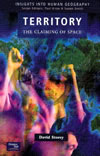Introducing David Storey
 Dr David Storey is Senior Lecturer in Geography at the University of Worcester, England. He was born and grew up in Ireland and has a BA in Geography and Economics, and an MSc in Geography from Trinity College, Dublin and a PhD from University College Cork. Prior to arriving at Worcester, dr Storey worked at the University of Glamorgan. His main research interests are in territoriality, nationalism and place; sport and national identity; rural development, heritage and place promotion.
Dr David Storey is Senior Lecturer in Geography at the University of Worcester, England. He was born and grew up in Ireland and has a BA in Geography and Economics, and an MSc in Geography from Trinity College, Dublin and a PhD from University College Cork. Prior to arriving at Worcester, dr Storey worked at the University of Glamorgan. His main research interests are in territoriality, nationalism and place; sport and national identity; rural development, heritage and place promotion.
A second edition of his book, “Territory: The Claiming of Space”, will be published later this year by Routledge. The title will change slightly into “Territories: The Claiming of Space”. In this interview, dr Storey talks about issues such as territoriality, the borderless world and the meaning of contingent sovereignty.
Interview
Defining territory, territoriality and territorialisation
What is the difference between territory, territoriality and territorialisation?
 The three are obviously connected.
The three are obviously connected.
At a very basic level territory can be taken to refer to a geographically bounded space claimed or occupied by a person or group of persons or by an institution. States are the most obvious examples of territorial formations.
However, as the recent work of Stuart Elden and others emphasises, territories and their boundaries (concepts which we tend to take for granted) reflect a distinctive mode of social and spatial organization which is dependent on particular ways of calculating and thinking about geographic space.
Territoriality refers to the claiming of space by individuals or groups. While some see this as a natural human trait, the work of Robert Sack and others has been useful in highlighting the social and political context in which territorial behavior occurs.
Territorial strategies are used to achieve particular ends; the control of geographic space can be used to assert or to maintain power, or, importantly, to resist the power of a dominant group. Territoriality is deeply embedded in social relations and territories, and the ways in which they are produced, result from social practices and processes, emerging under particular conditions and serving specific ends.
Territorialisation can be seen as the process though which space is divided into formally or informally bounded entities.
Why do you think that the mechanisms of territorialisation are a more important research topic than territory as such?
I am not sure that they are.
What interests me in particular is the use of territorial strategies as a political device. Territorial discourses and tactics are employed to attain certain objectives, whether these are bound up with maintaining power or with resistance.
What are territorial imaginaries and how can they affect conflicts between people?
We are socialised into thinking about space in certain ways. This operates across spatial scales so that nationalists think in terms of ‘their’ territory; people may identify with their own locality, town, village etc.
while even at quite micro-levels ideas such as having your own space in a workplace, your own room in a house or your own personal space assume great significance. When ‘our’ territory is encroached on, or our right to be there is challenged, we may react to this.
The contestation of space often leads to conflict (though we should not assume that this is inevitable).
National identity, globalisation, geography, history, language and culture
What is a national identity and how is this concept linked to territory?
National identity refers to feelings of belonging to a nation.
It is both a collective identity linked to supposed national characteristics and so-called national traits and may include such things as language and style of dress; an identity shared by the members of the national community.
National identity can also be seen in terms of the individual member’s sense of self as a national. An individual’s feeling and self-identification as ‘English’, ‘French’, ‘Spanish’ is an important component in their self-perception.
The intangibility of this sense of belonging is well reflected in Benedict Anderson’s idea of the the nation as an imagined community.
Which roles can geography play in the construction of a national identity?
While the importance of history in (re)producing a sense of national identity is clear, what is less widely acknowledged is the significance of geography.
A national past is seen to provide the glue that holds the nation together but alongside this is a national geography built around particular places and utilising explicit territorial allusions. Particular sites or particular landscapes – spaces and places – become imbued with meaning. Ideas of the national ‘soil’ and generic landscapes (usually rural ones) are seen to embody the essence of the nation (such as the mountainous and coastal west of Ireland).
Linked to this, huge significance is seen to attach to specific places so that, for example, Kosovo assumes huge importance in Serb nationalist narratives; a territory that must be retained (though its predominantly Albanian population see things differently).
How would you define globalisation and how has it affected the adherence of people to their national identity?
Globalisation refers to an increasingly interdependent and highly interconnected world where there are regular interactions (economic, social, cultural, political) between people in one place and those in other places.
What David Held and his colleagues have referred to as the stretching, deepening, intensification and speeding up of social relations across space, facilitated by the development of a global communications infrastructure, has had profound impacts on states and their borders. The evolution of a more global economy has had serous repercussions across the globe as current events dramtatically show.
Some suggest that this has diminished the significance of nations and national identity. However, this seems a little wide of the mark as, for example, secessionist nationalism has led to the creation of many new states in recent years with many other groupings continuing to seek independence for their ‘homelands’.
It might be argued that a more global world has also led to an inward-looking response by some in which there is a retreat to the supposed securities of a national identity and a desire to preserve elements of national culture and heritage. While some of this might be seen in a positive light (preserving elements of local cultures), the insular right-wing nationalism of some groups has serious consequences for ethnic minorities and immigrant groups.
Independence, Transnistria, capitalist system and borderless world
What are the essential features of the modern state?
What a state is may be hard to pin down precisely but the modern state is dependent on two essential features: territory and sovereignty. The first refers to the portion of space it controls, while the second refers to its right to control it.
Together, these two lead to the establishment of a third key feature – borders – which demarcate a state’s territory from that of its neighbours.
Why do you argue that the spread of the modern state has been a historically contingent process?
Despite the fact that we tend to take states for granted, they are a relatively recent human creation.
States are historically contingent, they are dynamic and they reflect processes through which territory (and those living in that territory) is controlled. States do not just happen; they are created and reproduced, and occasionally subject to challenge. Through the appurtenances of the state we come to think in a territorial way.
This state-centred approach reifies current political-territorial structures and tends to ignore the fact that, rather than being permanent features, they result from particular circumstances.
Modernist theorists argue that the state emerged to serve the needs of an evolving capitalist system, with the idea of the nation providing the cultural bond through which people could identify with it.
How has globalisation affected the position of modern states?
One argument is that globalisation spells the end of the state with transnational flows of capital, people and ideas, rendering borders irrelevant.
This hyper-globalist view seems to ignore the prevailing power of national identities but also plays down the contradictions within a globalising system where borders play a key role in controlling the movement of people.
The world may appear relatively borderless for leading politicians or business people but poorer migrants from many parts of the world are confronted with ever greater obstacles preventing them from crossing borders. The walls surrounding Spain’s north African enclaves of Ceuta and Melilla, or the lengthening sections of border wall between the USA and Mexico, are stark reminders of the power of the state and the continuing significance of borders.
To what extent have recent disagreements between states about the recognition of either a particular state’s sovereignty (e.g. only 75 states recognised Kosovo’s independence in April 2011) or government (e.g. only France and Qatar recognised rebel group as sole legitimate government of Libya in April 2011) structurally undermined the usefulness of the modern state concept?
I am not sure that they have.
Sovereignty has often been contested and opposed and territorial sovereignty is more of an ideal than a fully achieved reality.
Sovereignty is not just about self-declaration, it is contingent on its acceptance by external parties. Entities such as Transnistria (a break-away region within Moldova) have proclaimed their independence but no-one else recognises it.
Internal or external forces regularly impinge on the state’s ability to control. For example, Georgia has never really had sovereign control over all its claimed territory (most notably South Ossetia and Abkhazia).
The extent to which Iraq can be regarded as a fully independent sovereign state is open to serious question while the current debt crisis raises stark questions about the nature and extent of Greek, Irish or Portuguese sovereignty.
It is perhaps more realistic to view sovereignty as a work-in-progress. It is also the case that some powerful states appear considerably more sovereign than others.
